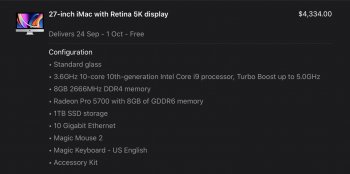Hi everyone,
To begin, I want to make it clear to anyone reading this thread that I have probably watched ALL reviews of the iMac 2020 27" on youtube, and most of the various threads on these forums regarding the upgrade options and performance benchmarks for this computer. Seriously, I've spent so many hours researching my upcoming iMac purchase that it's embarrassing to even admit.
Now that we got that out of the way..!
I'm a software developer using a 2011 27" iMac that I over the past two years have upgraded with a 3.4ghz i7, 500gb ssd, 16gb ram and a K2100M gpu, and the system is honestly working surprisingly well for its age. Thanks to the switched out gpu I've managed to install Catalina and can therefore use XCode 11. However, I have random crashes and reboots when the computer has been asleep for a while, I'll most likely not be able to install Big Sur and the new XCode 12, and the cpu is ridiculously slow compared to intel's 10th gen. In other words, it's time to buy a new computer.
Since I'm a software developer, compile times and being able to run VMs, many docker containers and multiple IDEs with large projects simultaneously is what I want my new iMac to handle flawlessly. Therefore I'm definitely going with the i9 over the i7. I don't care at all that the maximum performance gain I'll get from this probably is no more than 10% (and only when the workload is parallelised and heavy), because that's still a performance gain. So saving money by going i7 and instead upgrading the gpu because it's more bang for the buck is irrelevant in my case, because highly doubt the faster gpu will help with compile times, etc.
Furthermore, I do zero (!) video editing, zero gaming (might try some games in boot camp for fun though), and after selling my pro camera equipment I only shoot with my iphone nowadays, so no RAW editing in LR/PS either.
Based on all these parameters, wouldn't the smartest config for me to order be the mid tier iMac with the Radeon 5300 gpu, and just upgrade the cpu, storage and third-party ram? I have yet to see a single person go for this kind of config, with the most expensive cpu and the cheapest gpu, as every single person who owns an iMac seems to be a pro video editor and only care about final cut render times🤨
Correct me if I'm wrong, but the Radeon 5300 should be powerful enough to drive the built-in display, playback 4k videos, with zero problems, right? And in that case, why even spend money for the pricier top tier iMac, where the only difference from my config would be a mandatory 5500XT over the 5300?
The only downside I can imagine might be a lower resale value due to most people wanting those beefier gpus, but other than that, am I missing something? Will the 5300 in any way bottleneck the cpu for the type of work I do? Or might it even be the other way around, that the weaker gpu gives more "room" for the i9 when it's being pushed to its limits?


